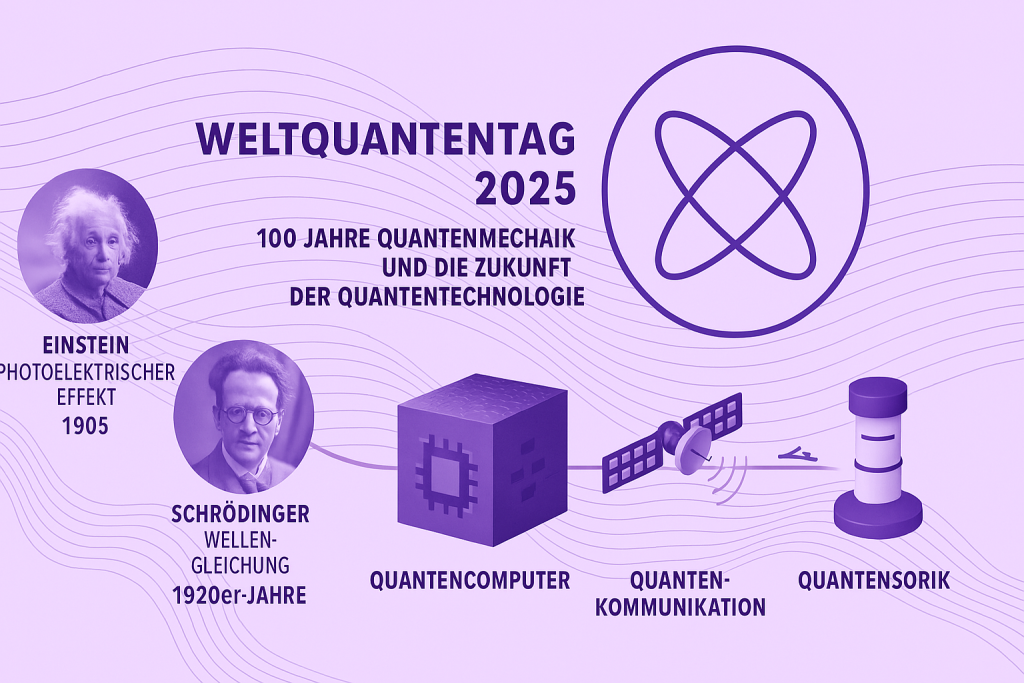
World Quantum Day will be celebrated on April 14, 2025 – a global initiative to raise public awareness of quantum science. The date refers to the rounded first digits of Planck’s constant (4.14 × 10-¹⁵ eV-s) and commemorates the fundamental principles of quantum mechanics, which were formulated 100 years ago. At the same time, 2025 will be celebrated as the “International Year of Quantum Science and Technology”, which recognizes the achievements of quantum research and its growing importance for science, business and security.
History and status quo of quantum technologies
The origins of quantum mechanics date back to the early 20th century and were mainly shaped by scientists in Germany. Max Planck laid the foundation for the field with his quantization of energy (1900). Albert Einstein expanded the concept with his explanation of the photoelectric effect (1905), which led to the development of wave-particle duality. In the 1920s, Werner Heisenberg and Erwin Schrödinger developed mathematical formulations that form the basis of modern quantum mechanics.
In the following decades, quantum mechanics enabled groundbreaking technological innovations – from the development of modern transistors to laser physics. The second quantum revolution, which began in the 1980s, also made use of quantum entanglement and created the possibility of quantum information processing.
Today, quantum technologies are one of the most dynamic fields of research with a wide range of potential applications. The most important areas of development are
- Quantum computers: Companies and research institutions worldwide are working on the development of scalable and fault-tolerant quantum computers.
- Quantum communication: Quantum cryptography, in particular through quantum key exchange procedures (QKD), enables tap-proof communication and is already being used in pilot projects.
- Quantum sensor technology: High-precision sensors based on quantum mechanical principles are revolutionizing areas such as navigation and medical technology.
Europe and Germany in particular have positioned themselves as leading players in this field. The EU, federal and state governments are investing billions in the further development of quantum technologies in order to tap into both the scientific and economic potential.
Future prospects: The “Mobile quantum computer” research program
An outstanding example of strategic research in the field of quantum computing is the “Mobile Quantum Computer” research program initiated by the Agentur für Innovation in der Cybersicherheit GmbH (Cyberagentur). The aim of the program is to research the aspects of location independence and rapid deployability with a view to application scenarios in the areas of security and defence. Parameters such as size, weight and energy consumption are to be considered at an early stage. Until now, these factors have hardly played a role in researching the overall systems – including the peripheral devices. The challenge is to make the quantum processors both more powerful and to integrate them into a mobile, energy-efficient and robust system.
In summer 2024, the Cyberagentur concluded contracts with leading technology companies to develop such systems:
- neQxt GmbH with the “maQue” project: The company neQxt, a spin-off from the University of Mainz, is researching scalable and mobile quantum computing solutions based on ion traps.
- Oxford Ionics Limited & Infineon Technologies AG with “Mini-Q”: The start-up Oxford Ionics from Great Britain is researching a mobile ion trap quantum computer together with the chip specialist Infineon.
- Quantum Brilliance GmbH & Parity Quantum Computing GmbH with “Diamonds-MQC”: The Australian-German company Quantum Brilliance, together with the Austrian start-up Parity Quantum Computing, is researching the use of nitrogen-vacancy centers (so-called NV centers) in diamonds for mobile, compact quantum computers.
Resilient cryptography for the quantum age
Side channel attacks (SCA) are attacks that aim to obtain hidden information, uncover properties of program routines or crack cryptographic systems. Information such as passwords, encryption keys or other sensitive data can be extracted. The Cyberagentur’s research program SCA4PQC (Secure Cryptographic Algorithms for Post-Quantum Cryptography) therefore aims to develop cryptographic algorithms that are resistant to attacks by quantum computers. The program researches innovative approaches to ensure the security of digital communication and data processing even in an era of powerful quantum computers. This includes analyzing existing cryptographic methods for their post-quantum security and developing new, quantum-resistant algorithms. The program contributes to strengthening Germany’s technological sovereignty in the field of cyber security and proactively addressing future threats.
Side-channel attacks with quantum sensors
It is also possible to carry out side-channel attacks on microchips by analyzing physical characteristics such as power consumption, electromagnetic radiation or the time sequence of processes. Various types of sensors can be used for this purpose. The Cyberagentur research program “Side-channel attacks with quantum sensors” (SCA-QS) aims to identify such attacks on microchips using quantum sensors and is evaluating the suitability of different sensor approaches for this purpose. As part of the program, the fields of classical side-channel analysis and quantum sensor technology, which otherwise have no overlap, are brought into contact with each other in order to jointly explore the potential of quantum sensor technology.
New era of quantum technology
100 years after the formal establishment of quantum mechanics, we are experiencing a new era of quantum technology. Germany and Europe are playing a leading role in the research and development of these groundbreaking technologies. World Quantum Day 2025 is an opportunity to recognize the achievements to date and set the course for the future. In particular, the “Mobile Quantum Computer” research program shows how quantum research is being harnessed for practical applications.
A look into the future shows: Quantum science will not only further deepen our understanding of the laws of nature, but will also open up revolutionary technological possibilities for business and security.
Further information and registration:
- https://worldquantumday.org/
- https://www.cyberagentur.de/programme/mqc/
- https://www.cyberagentur.de/presse/vertraege-mit-technologieunternehmen-zur-entwicklung-mobiler-quantencomputer/
- https://quantumbrilliance.com/
- https://parityqc.com/
- https://www.neqxt.org/
- https://www.oxionics.com/
- https://www.infineon.com/trappedions
- https://www.cyberagentur.de/programme/sca4pqc/
- https://www.cyberagentur.de/programme/sca-qs/
